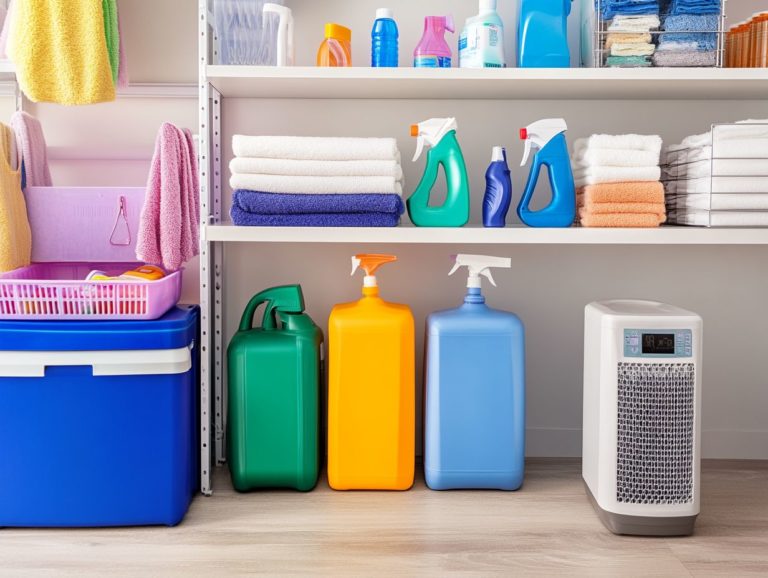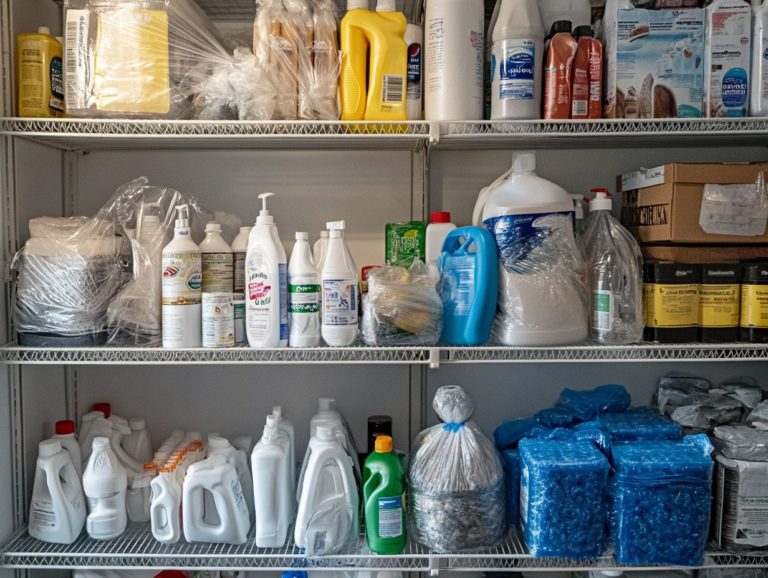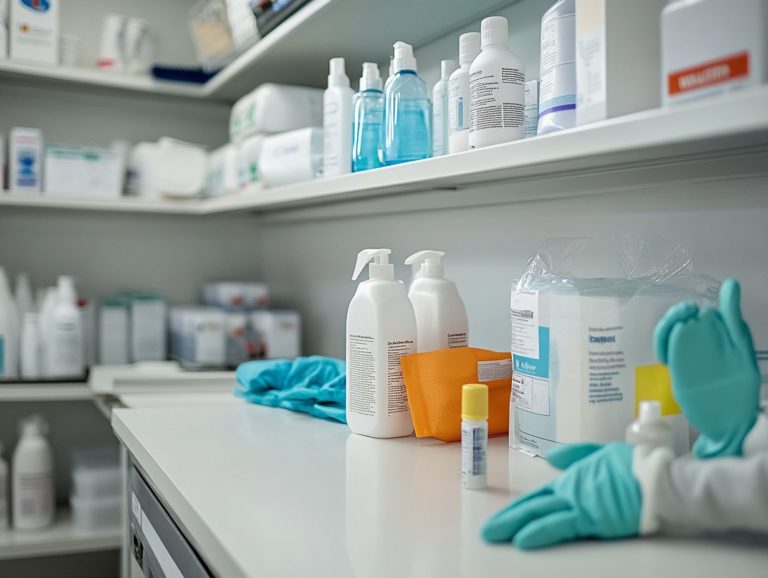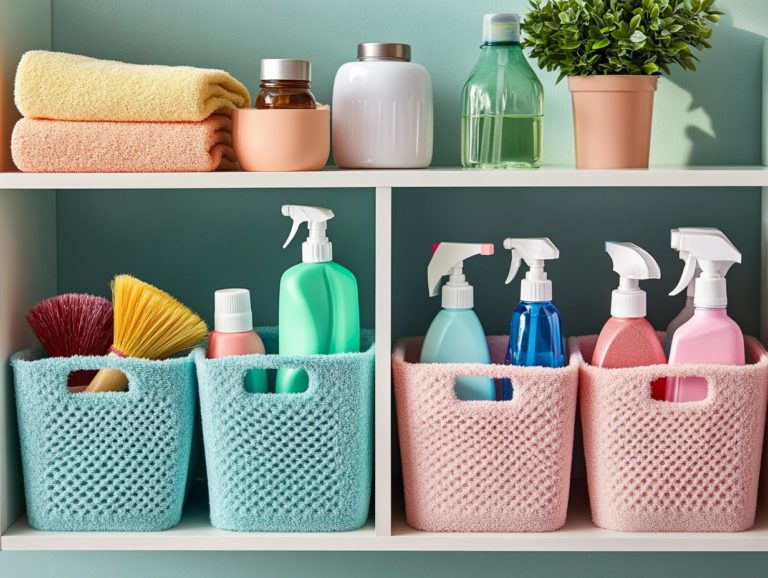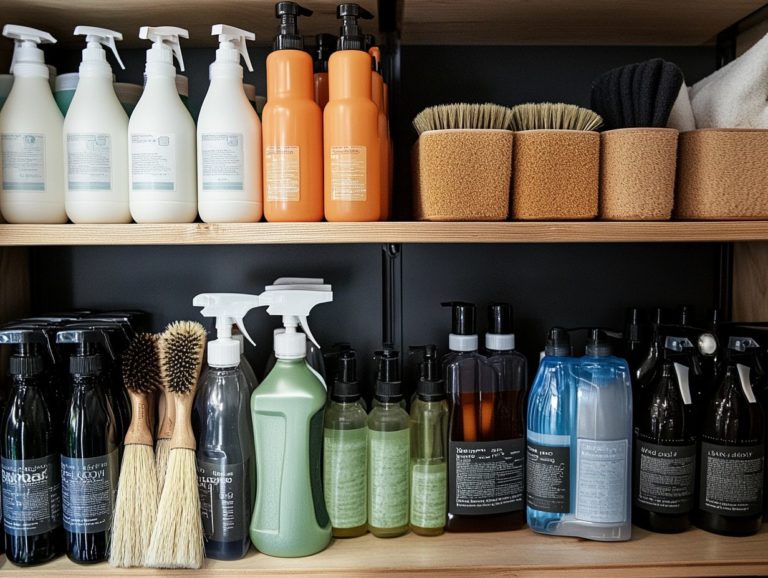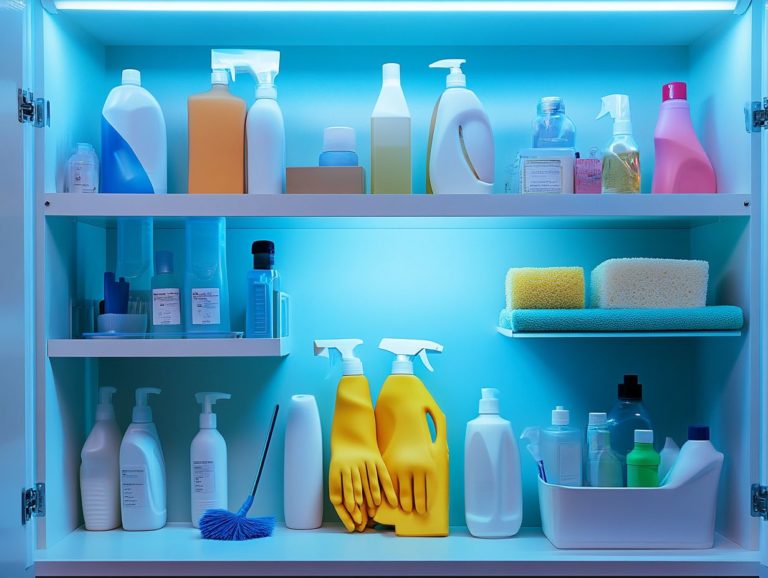Understanding the Shelf Life of Cleaners
When it comes to maintaining a clean and safe home, understanding the shelf life of your cleaning products is of utmost importance in your cleaning process.
Many individuals tend to overlook this critical aspect. Using expired cleaners can diminish their effectiveness and potentially pose health risks. This article delves into the shelf life of various cleaning products, exploring the factors that influence their longevity, such as proper storage, and how to store them for maximum efficacy.
Additionally, you’ll find invaluable cleaning tips for identifying expired cleaners, understanding the associated risks, and following best practices for disposal. Equip yourself with the knowledge to ensure that your cleaning routine remains both effective and safe.
Contents
- Key Takeaways:
- What is the Shelf Life of Cleaners?
- Why is Shelf Life Important for Cleaners?
- What Factors Affect the Shelf Life of Cleaners?
- 3. Storage Conditions
- How to Properly Store Cleaners?
- 1. Temperature
- What are the Signs of Expired Cleaners?
- What Are the Risks of Using Expired Cleaners?
- How to Dispose of Expired Cleaners?
- How to Extend the Shelf Life of Cleaners?
- Frequently Asked Questions
- What is the shelf life of cleaners?
- Why is it important to understand the shelf life of cleaners?
- How can I determine the shelf life of a specific cleaner?
- What factors can affect the shelf life of cleaners?
- Can I still use a cleaner past its expiration date?
- How can I extend the shelf life of my cleaners?
Key Takeaways:
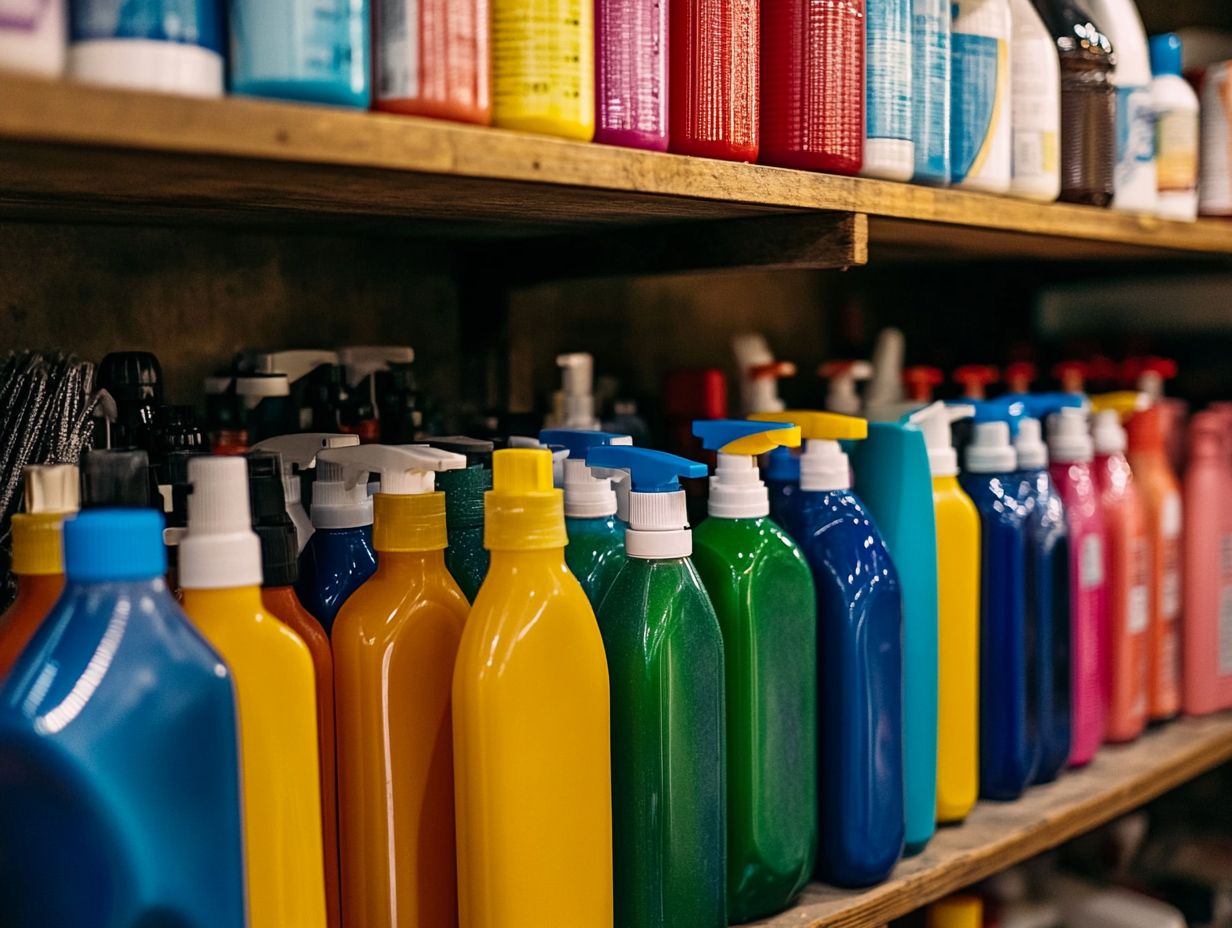
- Knowing the shelf life of cleaners helps maintain their effectiveness and safety.
- Ingredients, packaging, and storage affect how long cleaners last.
- Store cleaners properly and check expiration dates regularly.
What is the Shelf Life of Cleaners?
The shelf life of cleaners signifies the period during which these products maintain their effectiveness and safety. This is an essential consideration for upholding the quality of your household cleaning routines and ensuring they remain safe to use.
You ll often find expiration dates clearly marked on cleaning product labels, guiding you on the optimal timeframe for peak performance. Shelf life varies greatly based on the formulation of the product, ranging from mere months to several years.
Factors such as ingredients, packaging, and storage conditions all play a vital role in determining how long your cleaning products will serve you well.
Why is Shelf Life Important for Cleaners?
Understanding the shelf life of your cleaning products is essential for maintaining safety and effectiveness in your household routines. Using expired cleaning solutions can lead to subpar cleaning results and potential health hazards.
Don’t let expired cleaning agents let you down! They may fail to keep your home fresh and clean. Moreover, expired products can also pose environmental risks if not disposed of properly, making it imperative to be aware of cleaning product expiration for both your safety and environmental responsibility. For consumer information, it’s always wise to check the latest guidelines from the Environmental Protection Agency.
For instance, bleach loses its potency over time. Using it past its expiration date can prevent you from effectively eliminating harmful germs, leaving surfaces compromised. Disinfectants, which are cleaning products that kill germs, also degrade, rendering them less effective against bacteria and viruses.
Cleaning experts recommend always checking the expiration dates and replacing old products to maintain freshness and ensure safe usage. To stay on top of expiration dates, regularly check labels for specific shelf-life guidance and organize your cleaning supply cabinet, discarding any items that have surpassed their recommended usage.
Following best practices like storing products away from extreme temperatures and moisture can further enhance their effectiveness. This ensures a safer and cleaner home environment for you and your loved ones. Brands like Trumans and Seventh Generation offer a variety of cleaning supplies that emphasize longevity and safety.
Take charge of your cleaning routine today! Regularly check your supplies to keep your home safe and spotless.
What Factors Affect the Shelf Life of Cleaners?
Numerous factors can profoundly affect the shelf life of your cleaning products, ensuring they retain their effectiveness for the tasks at hand. The composition of the cleaning agents plays a crucial role, as certain ingredients, like hydrogen peroxide and ammonia, are prone to degradation over time.
The quality of the packaging is important because it directly influences the product’s stability. Moreover, if these products are stored in less-than-ideal conditions think extreme temperatures or humidity their lifespan can diminish considerably.
By understanding these factors, you can boost the effectiveness of your cleaning supplies.
1. Ingredients
The ingredients in cleaning products are pivotal in determining their shelf life, as some agents offer greater stability than others. Cleaning formulations are designed with specific ingredients like surfactants and organic solvents to maximize effectiveness.
Take surfactants ingredients that help break down grease and dirt, which boast impressive chemical stability for example. In contrast, bleach-based cleaners are formidable disinfectants, yet they tend to lose their potency when exposed to heat and light, resulting in a notably shorter shelf life. Additionally, organic solvents like alcohol can evaporate quickly, diminishing their effectiveness if not stored correctly. Cleaning experts from the American Cleaning Institute recommend using products within their specified shelf life to ensure optimal performance.
By grasping these nuances, you enable yourself to make informed decisions about your cleaning supplies, ensuring you select products that will deliver peak performance for as long as possible.
2. Packaging
The packaging of cleaning products is crucial for preserving their effectiveness, as it shields the contents from environmental factors that could jeopardize their quality. Packaging plays a critical role in cleaning product care, ensuring cleaning compositions remain stable over time.
You ll find bottles, pouches, and aerosol cans, each designed with specific functions to protect the product. Bottles of cleaner often come with seals to prevent contamination. Certain materials excel at providing robust barrier protection against moisture, air, and light elements that can degrade the product over time.
Opaque containers are used for light-sensitive solutions, while sealed packaging guarantees that concentrations and freshness are maintained.
Effective labeling is essential, ensuring you are informed about disposal instructions and any necessary safety precautions. By adhering to best practices for cleaning product care and proper storage such as keeping them in a cool, dry place and away from direct sunlight you can significantly extend their shelf life and safety. Brands like Blueland and Therapy Clean advocate for sustainable packaging that maintains product stability.
Take a moment to check your cleaning products. Ensure they are stored correctly for the best performance!
3. Storage Conditions
Storage conditions are paramount for extending the shelf life of your cleaning products, with temperature and humidity standing out as the two most significant factors influencing their longevity. Proper storage is a cleaning necessity for maintaining product effectiveness.
To ensure these items remain effective, you should keep them in a cool, dry space, ideally within a temperature range of 50 F to 80 F. Excessive heat can cause volatile components substances that can easily evaporate at room temperature to evaporate, while cold temperatures risk separating formulas or diminishing their effectiveness. You can easily manage and organize your cleaning cabinet to avoid these issues.
Humidity is another crucial element; elevated moisture levels can foster mold growth or lead to container corrosion, ultimately compromising the product’s integrity. When organizing your cleaning cabinet, be sure to store all items upright, tightly sealed, and shielded from direct sunlight. This way, you can protect your products from degradation and achieve the best possible results in your cleaning endeavors.
How to Properly Store Cleaners?
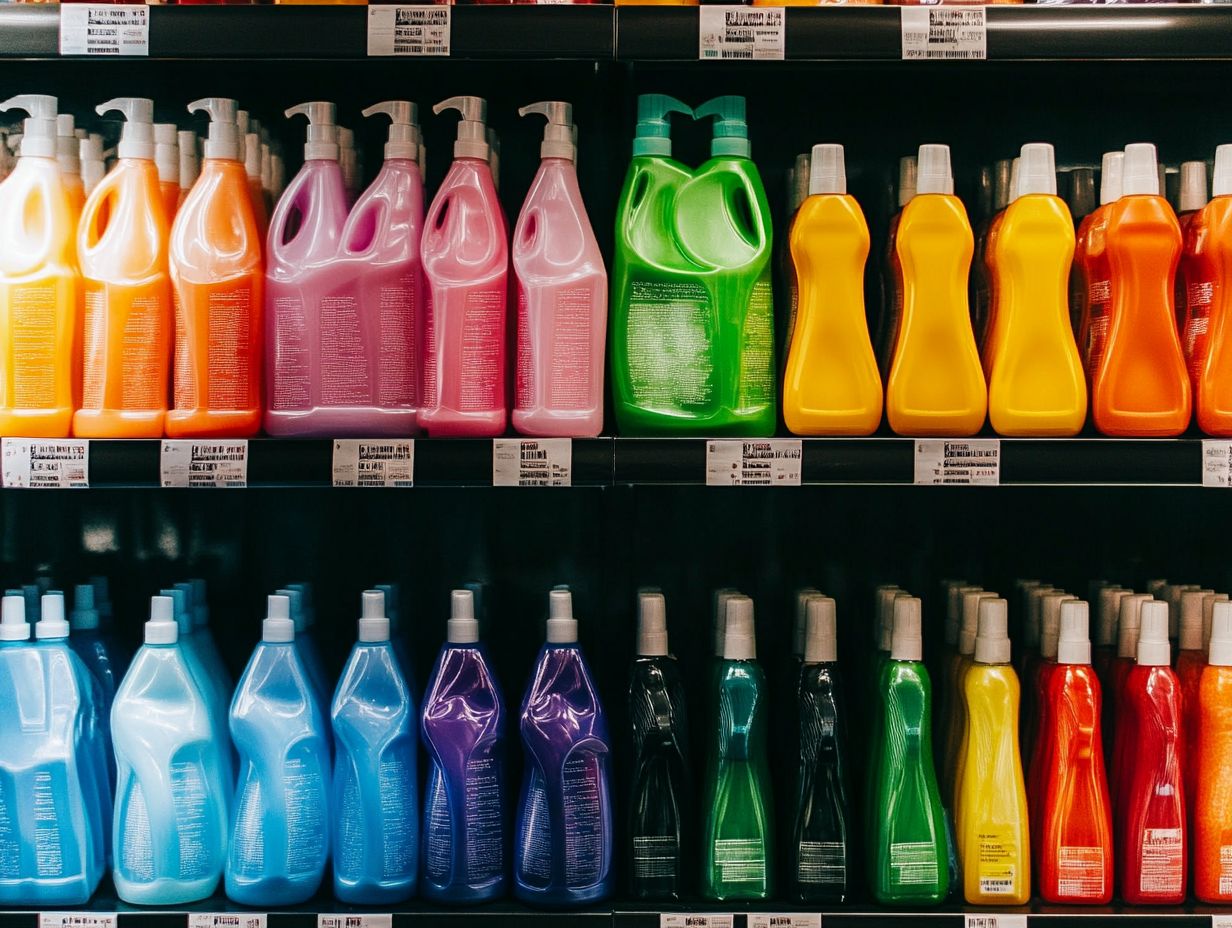
Proper storage of cleaning products is vital for maximizing their shelf life and ensuring they remain effective for your cleaning routines. This involves thoughtful consideration of factors such as temperature, humidity, and light exposure. Storing products correctly helps keep them stable and effective.
To maintain the quality of your cleaning products, store them in a cool, dry place, away from direct sunlight and extreme temperatures. Developing good cleaning habits like regularly checking expiration dates and adhering to disposal instructions will enhance product effectiveness and support your overall cleaning maintenance.
1. Temperature
Temperature is crucial to the effectiveness and longevity of your cleaning products. Exposing them to extreme heat or cold can seriously compromise their cleaning prowess. Proper storage and management are essential cleaning strategies.
For example, many household cleaners, detergents, and disinfectants thrive when stored at temperatures between 50 F and 80 F. When they stray outside this range, their chemical stability may falter, resulting in diminished effectiveness or potentially hazardous reactions. Hazardous reactions refer to dangerous chemical changes that can occur under improper storage conditions.
To keep these essential supplies in peak condition, consider utilizing climate-controlled storage spaces, steering clear of direct sunlight and heating appliances. Regularly monitoring temperature and humidity levels with a reliable thermometer or hygrometer can help you maintain those ideal conditions. Brands like Clorox and Easy-Off provide specific guidelines for the proper storage of their products to ensure safety and effectiveness.
Organizing your storage areas for easy access can significantly improve how long your cleaning products last, allowing for frequent checks that enhance the longevity and performance of these crucial cleaning agents.
By following these storage tips, you ensure your cleaning products work effectively every time you need them!
2. Humidity
Humidity levels can profoundly influence the stability and effectiveness of your cleaning agents, with excessive moisture leading to the degradation of these products. Proper product storage, including managing humidity levels, is crucial for maintaining product effectiveness.
When you store your cleaning supplies in a high-humidity environment, certain agents particularly those with natural ingredients are more prone to breakdown, diminishing their cleaning power and altering their efficacy. Take bleach, for example; it can lose its potency when exposed to excessive moisture, ultimately compromising its disinfecting abilities. Cleaning experts from Real Simple suggest using dehumidifiers, which are devices that reduce humidity levels in the air, in storage areas to maintain appropriate humidity levels.
To safeguard against these effects, it’s essential to maintain a consistent humidity level, ideally between 30% and 50%. Employing dehumidifiers, ensuring proper ventilation the flow of fresh air in and out of a space and storing your products in airtight containers can help keep moisture at bay. Following these cleaning guidelines will help you achieve the best possible results in your cleaning endeavours.
Keep your storage areas cool and dark to protect sensitive cleaning agents from humidity-induced deterioration. This is essential for maximizing the lifespan of your cleaning agents, so you get the most out of your supplies!
3. Exposure to Light
Limiting exposure to light is vital for preserving the integrity of your cleaning products, as certain formulations can be sensitive to light. This sensitivity can lead to reduced effectiveness. Over time, ultraviolet rays can break down active ingredients, diminish their potency, and alter their chemical composition, rendering these products less effective against dirt, grime, and stains. This is especially true for products containing bleach, hydrogen peroxide, or essential oils, all of which are crucial for their cleaning power and overall cleaning quality.
By understanding the impact of light on these solutions, you can take proactive steps to ensure that your cleaning products perform optimally and last longer. This approach is part of maintaining a diligent cleaning process.
To minimize light exposure, it s best to store your cleaning products in dark, cool locations like cabinets or closets, well away from windows. Opting for opaque or dark-colored containers can further shield the contents from light damage. For example, hydrogen peroxide should always remain in its original brown bottle, which is specifically designed to protect it from light. Similarly, vinegar-based cleaners can deteriorate when exposed to excessive sunlight. Effective product storage is key to a long-lasting cleaning product lifespan.
Best practices for managing your cleaning products include:
- Regularly check expiration dates to ensure your cleaning agents remain effective.
- Organize your storage area for better cleaning product management.
- Be mindful of how sunlight can impact product storage following cleaning guidelines.
By following these guidelines, you can ensure that you maximize the effectiveness and shelf life of your cleaning supplies.
What are the Signs of Expired Cleaners?
Recognizing the signs of expired cleaners is crucial for maintaining both safety and effectiveness in your cleaning routine. Using outdated products can significantly compromise their performance and even pose health risks. Look out for common indicators that a cleaning agent has passed its prime, such as:
- noticeable changes in color or texture
- an unpleasant odor
- a decline in its cleaning prowess
By staying vigilant and aware of these signs, you enable yourself to make informed choices about when to use or dispose of your cleaning supplies. This is part of responsible cleaning product care.
1. Change in Color or Texture
A change in color or texture is one of the most apparent signs that a cleaning product may have expired. This signals a decline in its cleaning performance.
If your once-crystal-clear glass cleaner becomes cloudy or develops a gritty texture, it’s a clear indication that the formulation has separated or degraded. This leads to less effective cleaning results. Likewise, if a thick gel cleaner becomes runny or loses its thickness, that means its active ingredients are breaking down, directly affecting its ability to cling to surfaces and lift dirt. Such changes signify the end of the product lifespan.
Noticing these changes in your commercial disinfectants? They might indicate a shift in their intended use, as these alterations can reduce their effectiveness against germs and bacteria. Regularly evaluating your cleaning agents is essential to ensure they deliver the expected cleaning power when you need it most.
2. Foul Odor
A foul odor from a cleaning product clearly signals that it may have expired and should be avoided for cleaning tasks, as it poses safety risks.
Unpleasant scents vary from rancid to sour or vinegar-like, indicating chemical reactions that could be dangerous. Stay alert when using household cleaners; these off-putting aromas often hint at products that have degraded over time, losing their efficacy and potentially releasing toxic fumes.
If you encounter these unpleasant odors, prioritize your safety. Ensure proper ventilation in the area, wear gloves, and consider using a mask to shield yourself from inhaling harmful particles.
Dispose of these products responsibly ideally at a hazardous waste facility. This step prevents further exposure and helps maintain a safe environment. Always follow proper disposal instructions for the best results.
3. Ineffectiveness
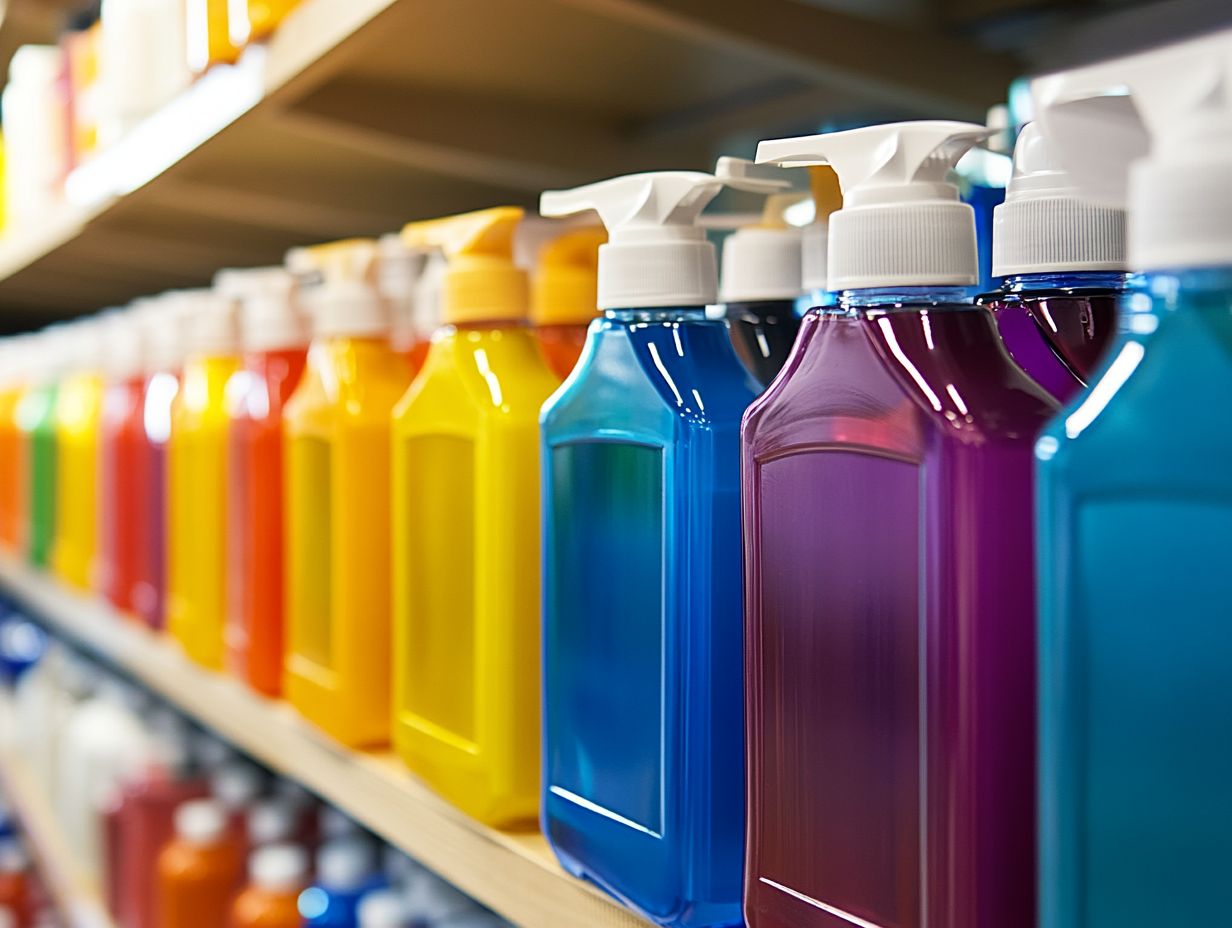
If a cleaning product isn t effectively removing dirt or stains, it might be time to face the facts: it could be expired and no longer effective, reflecting on its cleaning quality.
In situations like this, check the product’s expiration date and evaluate its ingredients and intended use. Recognizing its ineffectiveness can save you valuable time and effort, allowing you to tackle cleaning tasks with the right tools in hand. Using the right cleaning methods is vital for optimal results.
Before you commit to a new product, conduct a patch test in a discreet area. This simple step can reveal whether it lives up to its promises before broader application. This is one of the many useful cleaning tips to ensure product effectiveness.
If you determine that a cleaning product is ineffective, proper disposal is key. Check your local guidelines for hazardous waste disposal, or find drop-off centers that accept cleaning supplies. Protecting the environment is just as crucial as keeping your space spotless.
What Are the Risks of Using Expired Cleaners?
Using expired cleaners comes with risks, including reduced cleaning effectiveness and potential safety hazards impacting your health and the environment. Consumers must have the right information to make informed choices.
When these products surpass their expiration date, they not only fail to achieve the expected cleaning results but can also break down into harmful substances that may irritate your skin or respiratory system. Expired cleaners disposed of incorrectly can contaminate local water supplies, posing significant threats to ecosystems and wildlife. Follow disposal instructions carefully, as many cleaners contain hazardous materials that require special handling.
Conducting simple tests on cleaners before use can gauge their effectiveness, ensuring a safer and more efficient cleaning experience. Keep health and environmental safety at the forefront of your efforts.
How to Dispose of Expired Cleaners?
Proper disposal of expired cleaners is essential for maintaining your environmental responsibility and ensuring the safety of your household. Improper disposal can lead to harmful effects and environmental damage. Use product disposal methods that align with local regulations.
Understanding how to dispose of these products safely is crucial. It s wise to consult your local disposal guidelines, which often provide specific instructions on handling various types of cleaning agents.
- Many communities offer designated hazardous waste collection events or drop-off locations specifically for these materials.
- You might also consider environmentally friendly alternatives, like donating unused but safe products or utilizing refill stations for your cleaning solutions, which can help reduce landfill waste. Turn to cleaning experts for guidance on sustainable practices.
Being informed about proper disposal methods enables you to make choices that positively impact not only your home but also the broader environment. This knowledge helps you contribute to a healthier planet.
How to Extend the Shelf Life of Cleaners?
Extending the shelf life of your cleaning products requires you to embrace effective cleaning strategies and practice proper care. By doing so, you can significantly enhance both their longevity and performance. This will ensure your cleaning agents remain safe to use and effective.
Adhering to specific guidelines for storage, regularly checking expiration dates, and using the products as directed will keep your cleaning supplies effective for their intended purposes. This proactive maintenance approach not only helps you save money by minimizing waste but also cultivates a responsible and efficient cleaning routine. Get tips from trusted sources like Better Homes & Gardens, Real Simple, and the American Cleaning Institute to ensure top-notch cleaning!
1. Proper Storage
Proper storage is one of the most effective strategies you can employ to extend the shelf life of your cleaning products, ensuring they maintain their cleaning quality and effectiveness over time. This also contributes to product stability and longer-lasting cleaning performance.
Keep these substances in their original containers and seal them tightly after each use to minimize exposure to air and moisture, both of which can degrade their effectiveness. It s equally important to store your cleaning agents in a cool, dry place, away from direct sunlight. Remember, heat can accelerate chemical breakdowns. By maintaining ideal conditions stable temperatures and low humidity you not only enhance the longevity of your products but also promote safe practices that help prevent accidents or spills. This is key to smart storage!
Understanding these specific storage methods is crucial for managing your cleaning products effectively, ultimately leading to more efficient cleaning routines.
2. Regularly Check Expiration Dates
Make checking expiration dates a priority to maintain the effectiveness of your cleaning products and ensure that expired cleaners don t sneak into your cleaning routines. This is a key aspect of cleaning maintenance.
This practice guarantees that your surfaces are properly sanitized while also protecting you from the potentially harmful effects of using ineffective chemicals that could harbor bacteria or allergens. Label your cleaning supplies with purchase dates for easy tracking or set a calendar reminder a few months in advance. Proper cleaning product labeling and product storage can help maintain freshness and ensure cleaning product management.
Another smart strategy is to organize your cleaning products in designated areas, such as a cleaning cabinet, making it easy to spot items that need your attention. By understanding consumer information and product guidelines, you can further enhance the effectiveness of your cleaning routines and contribute to a healthier living environment. Consulting cleaning experts and resources like Martha Stewart or Real Simple can provide valuable cleaning tips.
Start using these disposal methods today for a cleaner, safer home!
3. Use Cleaners as Directed
Using cleaners as directed is essential for maximizing their effectiveness. Improper usage can seriously degrade cleaning performance and reduce shelf life.
By adhering to the manufacturer s guidelines and cleaning standards, you can unlock the full potential of your cleaning products. Proper product testing ensures that cleaning solutions remain effective.
For instance, when you use bleach, diluting it according to the instructions allows it to disinfect surfaces effectively while avoiding any damage. Surface cleaners specify the time they need to work, allowing the solution to penetrate and thoroughly remove dirt.
This meticulous attention to detail not only optimizes the efficiency of your cleaning products but also fosters a safer cleaning environment. Following cleaning guidelines for each product is crucial for maintaining quality.
Over time, routine misuse can diminish the formula, making the cleaner less effective and potentially resulting in an unclean space. Store your cleaners properly to ensure they work their best every time!
Good cleaning product care can prevent expired cleaning and ensure environmental responsibility.
Frequently Asked Questions
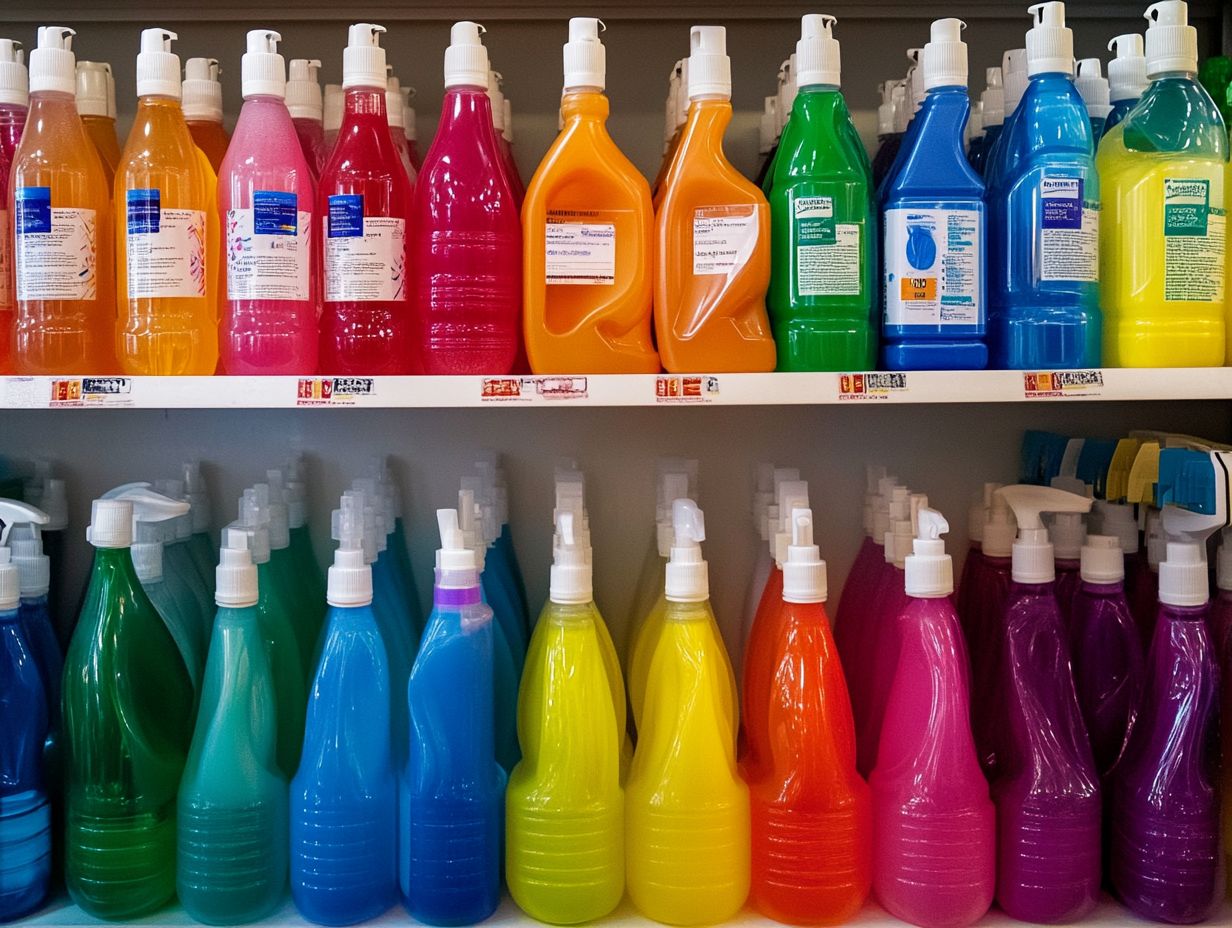
What is the shelf life of cleaners?
The shelf life of cleaners refers to the length of time that a cleaning product can be stored before it starts to lose its effectiveness and quality. Understanding cleaning product expiration is essential for maintaining quality.
Why is it important to understand the shelf life of cleaners?
Understanding the shelf life of cleaners is important because using expired products can decrease cleaning performance and pose potential health hazards. Following disposal instructions is crucial for cleaning safety.
How can I determine the shelf life of a specific cleaner?
The shelf life of a cleaner can usually be found on the product label or packaging. If not, contact the manufacturer for more information; this is part of good cleaning product management.
What factors can affect the shelf life of cleaners?
- Exposure to sunlight
- Extreme temperatures
- Contact with air or other chemicals
- Improper storage or usage
Ensuring product stability through proper storage is essential.
Can I still use a cleaner past its expiration date?
It is not recommended to use a cleaner past its expiration date because it may not clean effectively and could potentially cause harm. Dispose of expired cleaning products and use a fresh product for optimal performance.
Product disposal according to disposal instructions is also important.
How can I extend the shelf life of my cleaners?
To extend the shelf life of your cleaners, store them in a cool, dry place away from direct sunlight and extreme temperatures. Make sure to close the containers tightly after each use.
Avoid mixing different cleaners together. Proper storage and cleaning product care are key to maintaining freshness and cleaning effectiveness.
Keep your space sparkling by using your cleaners wisely!

